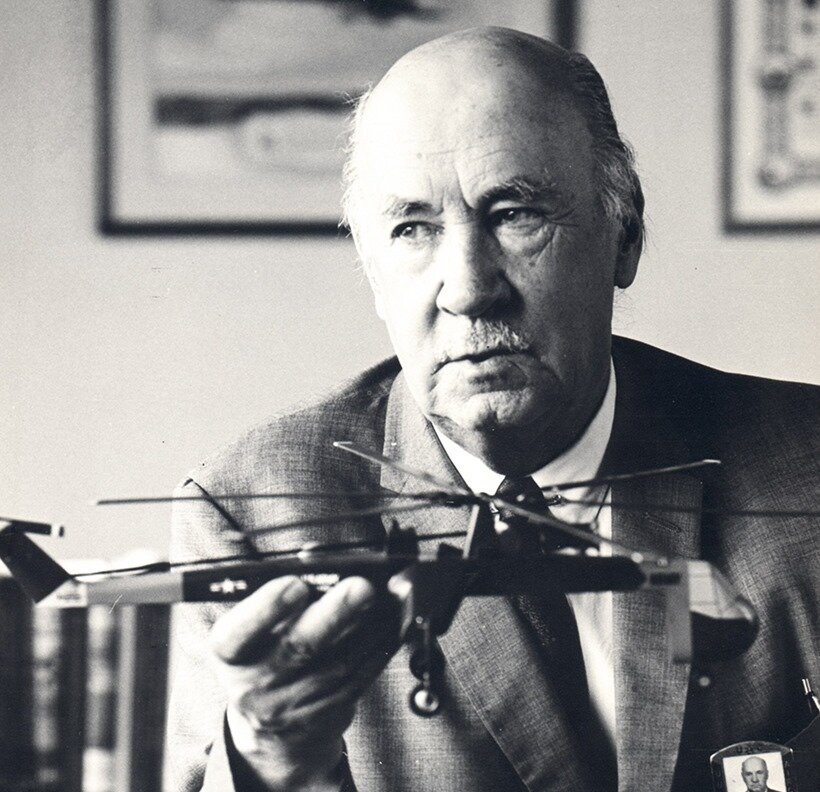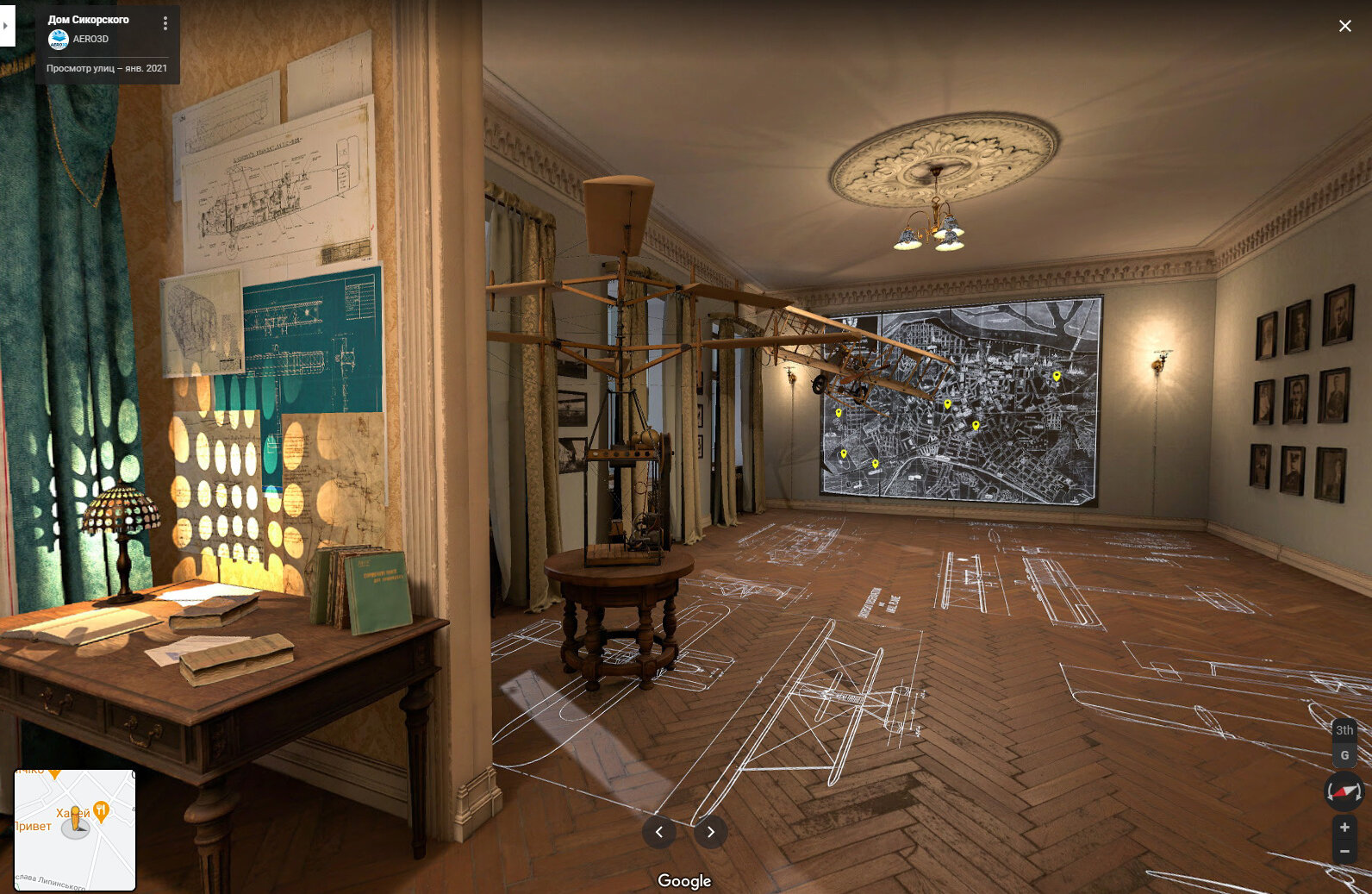Ihor Sikorsky, the Kyiv-born aviation pioneer, has plenty of namesakes in Ukraine’s capital.
They include the municipal airport, a polytechnic university, a preparatory school for the nation’s aviation university, a commemorative coin issued by the central bank and a street where the U.S. embassy is currently situated.
Yet the only museum to his name is a virtual one, a three-dimensional online exhibit of Sikorsky’s life and achievements in revolutionizing aviation by advancing helicopter and airplane technology.
The building where the famous aircraft designer was born and reared, a prime real estate location near the historic Golden Gate, has stood neglected and dilapidated for years and is mired in legal disputes.
Its ultimate owner, the Defense Ministry, didn’t respond to the Kyiv Post’s request for comment about the building’s current status, estimated value, plans for renovation and legal situation — the Kyiv Pechersk District Court in January 2018 froze the asset because the building lacks a code in an official database.

Aviation pioneer Ihor Sikorsky (1889-1972). He emigrated to the United States in 1919. Sikorsky founded the Sikorsky Aircraft Corporation. (Courtesy)
‘Bureaucratic hurdles’
The three-story, brick and yellow-colored building enjoys landmark status at 10-B Yaroslaviv Val near the Golden Gate metro station and is in an “emergency state and requires immediate priority emergency work with subsequent restoration,” the Kyiv City Department of Communal Property told the Kyiv Post by email.
Since 2017, the municipal government said it had asked the Defense Ministry and other national government bodies more than once to give it the property so that “restoration work” could begin before it decays completely.
Kyiv Mayor Vitali Klitschko’s office told the Kyiv Post that “bureaucratic hurdles” are the cause of the 1,692-square-meter (18,212 square foot) building’s structural demise.
“We have repeatedly stated that the municipality is ready to take possession of the building to restore it and set up a museum recognizing the world-famous aircraft designer,” the mayor’s office said.
Klitschko added that the city has invited the Defense Ministry to jointly design “a museum concept” with no results. He has also been in contact with Sergiy Sikorsky, the son of the legendary aircraft designer who also retired as a senior executive of the Sikorsky Aircraft Corporation that his father founded.
However, “(Sergiy Sikorsky) is in his 90s already,” the mayor said.
In a separate response to the Kyiv Post, the municipal cultural heritage preservation department said “the landmark isn’t being utilized, is kept in an improper and neglected state… (and there) is no security contract signed with the (cultural heritage) department to protect the premises.”
Help from US
News of foreign assistance to help restore the building — mainly from the United States — briefly made the news when Servant of the People lawmaker Arseniy Pushkarenko on Feb. 4 said in parliament that both the Sikorsky Corporation and the U.S. government “are ready to financially take the implementation of this project.”
When contacted by the Kyiv Post, Pushkarenko clarified that his statement referred to his communication with Jim Slattery, who last served as a congressman in the U. S. House of Representative in 1995.
Perhaps best known for the world’s first production helicopter, the R‑4, and the flying S‑42 Clipper boat, Sikorsky’s corporation, now owned by defense giant Lockheed Martin, didn’t respond to a Kyiv Post request for comment.
The U. S. Embassy in Ukraine said it was “aware of interest in renovating the former home of Ihor Sikorsky.”
However, U. S. Embassy spokesperson Daniel Langenkamp told the Kyiv Post that the “U.S. government has no plans to be involved” in renovation efforts.
Turning it into museum
A murky nonprofit had a 49-year lease of the building, intent on its preservation until the Defense Ministry — through the Kozatky Hotel it also owns near Independence Square — secured its annulment in 2016, lawmaker Pushkarenko said.
Pushkarenko said he and about 50 other lawmakers have petitioned the Defense Ministry to transfer ownership of the building either to the Culture Ministry or the city for restoration work to begin and move forward with its conversion to a museum.
According to the Justice Ministry’s real estate registry, the building’s “inventory objects” were frozen by a court ruling three years ago. The only reason given is that it lacks a code number.
The Cultural Heritage Preservation department stated that a Kyiv City Court ruling from 2018 had frozen any sale or purchase of the building.

The only museum to Ihor Sikorsky is a virtual one: a three-dimensional online exhibit of Sikorsky’s life and achievements in revolutionizing aviation by advancing helicopter and airplane technology. (Courtesy)
The freeze was based on a legal motion filed by the military’s prosecutorial office “to preserve physical evidence in a criminal case against the management of the Kozatsky Hotel… that prevents the transfer of the property to the communal property of the territorial community of Kyiv.”
As of Feb. 22, when the Kyiv Post visited the address, the hollow building languishes in disrepair. Parts of its roof is exposed from damage, bricks fill some lower-level windows presumably to prevent squatters or people without shelter from living there. Signs warn that parts of the façade survived a fire.
As a consolation, fans and Sikorsky history buffs were treated to an online, virtual tour and museum at the location starting in summer 2020.
The Creative Ukraine nonprofit group, headed by Viktor Hirza, launched the endeavor with financial assistance from the Culture Ministry’s Ukrainian Cultural Foundation.
Available in English and Ukrainian, the museum website offers a three-dimensional layout of the building, including Sikorsky’s bedroom, biographical information, lectures and excursions.
Based in Slavutych, 124 miles by car from Kyiv, Girza declined to talk to the Kyiv Post by phone and insisted on meeting in person.
Derelict building
Kyiv historian Mykhailo Kalnytsky said the Sikorsky building was once an auxiliary unit of the Soviet Union military’s Red Star hotel on the same street. Ownership was transferred to the Defense Ministry after Ukraine’s independence in 1991.
He said the building can be characterized as “brick architecture” in that it uses “unusual compositions” that highlight the qualities of the building material.
Sikorsky’s father, Ivan Sikorsky, bought the home in 1885 as a single-story wooden structure before having it upgraded to three floors with an outbuilding. A row of garbage cans line what used to be the main entrance of the building, now with a semi-collapsed roof.
Preservationists have lined the tunnel walls leading into the courtyard with sheets of paper describing the aviation designer’s biography and achievements, including pictures of him and his models in the courtyard where he often experimented.
In 1904, the family moved into the first floor of the building while Ivan Sikorsky, a trained psychologist who taught at the Saint Vladimir University (currently Taras Shevchenko University), used the upper two floors as a medical and pedagogical institute for children who were mentally challenged and suffered from nervous system problems.
Famous Ukrainian composer Mykola Lysenko also rented space there for his musical and drama school that later was transformed into an institute.
In the courtyard, Ihor Sikorsky built his first prototype aircraft that resembled air sleds. A scale model of one of his first helicopter designs stands in the courtyard, placed there by local conservationists.
During World War II, the building served as the headquarters of the Soviet Kyiv Air Defense Corps.
Ihor Sikorsky completed his studies at the Kyiv Polytechnic University after in 1906 quitting the maritime cadet school in St. Petersburg, then the capital of Tsarist Russia of which the greater portion of Ukraine, including Kyiv, was a part. He had also studied in Paris before returning to Kyiv in 1907.
He fled the country after the Bolshevik revolution began in 1917 and ended up back in Paris. Two years later, he emigrated to the U.S. where he eventually found the Sikorsky Aero Engineering Corporation in 1923.
By 1939, he personally took off on his Vought-Sikorsky VS‑300 (S‑46) helicopter. It received the model number 300 for being the third helicopter he built. He built the previous two unsuccessful models in Kyiv, according to the virtual Sikorsky museum.
“I had learned enough to recognize that with the existing state of the art, engines, materials, and — most of all — the shortage of money and lack of experience… I would not be able to produce a successful helicopter at that time (1909–1910),” he said, according to Encyclopedia Britannica.
Ihor Sikorsky died in 1972.
